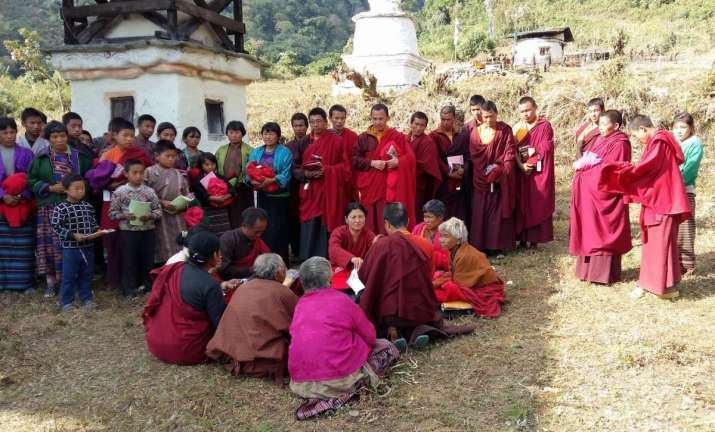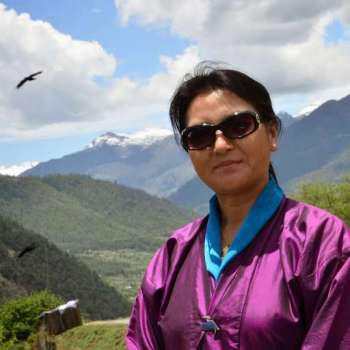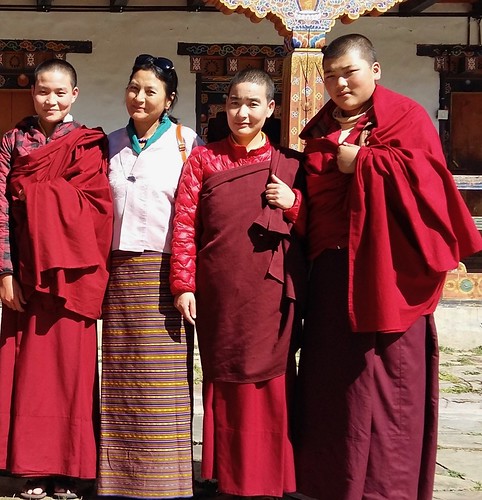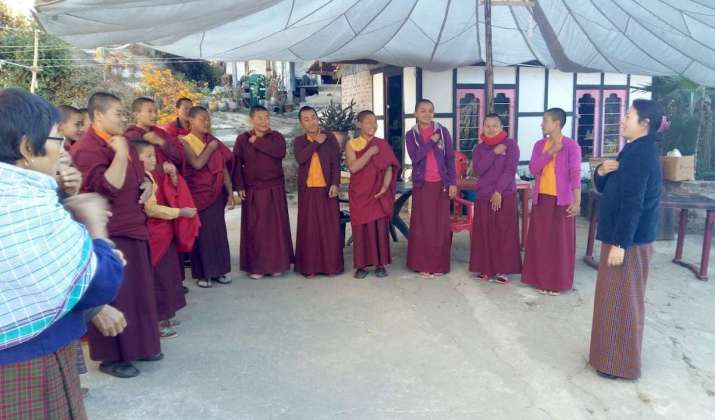Changing Mindsets: Tashi Zangmo and the Bhutan Nuns Foundation
By Caitlin Dwyer
Buddhistdoor Global
| 2018-05-16 |  The BNF focuses on helping nuns become well-educated, well-trained leaders in their communities, closing educational gaps and alleviating poverty. Image courtesy of the BNF
The BNF focuses on helping nuns become well-educated, well-trained leaders in their communities, closing educational gaps and alleviating poverty. Image courtesy of the BNF“I always say that it’s one in a million,” says Dr. Tashi Zangmo. “It’s a narrow escape.”
Tashi was 11 years old when she went to school for the first time. She was lucky that her mother had asked her if she wanted to try school—almost no one in her village in Bhutan did so at that time. Her “one in a million” chance came when Tashi, the third youngest of eight children, became the first girl in the village to go. The school was a day’s walk away, so she boarded there and had to cook her own food. “It was very tough,” she recalls.
A passion for education has been a key part of her life ever since. Now the executive director of the Bhutan Nuns Foundation (BNF), Dr. Zangmo devotes her energy to the empowerment of Buddhist nuns in Bhutan. Under the guidance of the Queen Mother, Tshering Yangdoen Wangchuk, the foundation focuses on helping nuns in this Buddhist nation become well-educated, well-trained leaders in their communities, closing educational gaps, alleviating poverty, and helping with hospice care. The nuns that the BNF trains are already doing much of this behind the scenes, explains Dr. Zangmo; the foundation simply provides the visibility and training they need to be most effective.
 Dr. Tashi Zangmo. Image courtesy of the BNF
Dr. Tashi Zangmo. Image courtesy of the BNFDr. Zangmo completed her PhD thesis at the University of Massachusetts-Amherst on education for female monastics, and then returned to her home country determined to help the girls and women in Bhutan’s nunneries gain access to quality education. Founded in 2009, the Bhutan Nuns Foundation works with 28 Buddhist nunneries throughout the nation. Under the patronage of the Queen Mother, the foundation is dedicated to closing “gender and geographic equity gaps” in the Himalayan kingdom.
Dr. Zangmo’s own educational path—studying in India and the United States—was unusual; most girls who seek education in Bhutan do so through religion. However, formal curricula for nuns remain unregulated and underfunded. One of the Bhutan Nuns Foundation’s stated goals is to establish a shedra, or monastic college, where the nuns can pursue higher education.
The foundation’s main role so far has been identifying and building much-needed infrastructure, but Dr. Zangmo hopes that they are ready to begin moving into the provision of more training for the nuns themselves. This was her original goal, but was put on hold when she began the project.
“When we started our work, we started from scratch. We started giving training to the nuns,” she explains. “When we went to visit the nunneries, we very quickly realized that they didn’t have access to basic necessities such as proper bathrooms, and nutrition was also very bad. It’s ironic to ask them to give health and hygiene and nutrition training when they don’t have sufficient food to put on the table or running water or proper toilets in most of the nunneries.”

Dr. Tashi Zangmo with some of the nuns under the umbrella of the BNF.
Image courtesy of the BNF
Unlike monks, many nunneries in Bhutan do not receive state support, and they sometimes struggle to meet basic necessities. Therefore, the foundation’s first 10 years have been spent building the necessary infrastructure to support Buddhist nuns: improving living quarters, providing access to running water, and building toilet facilities. Nearly a decade into the foundation’s work, Dr. Zangmo is optimistic that most of the nunneries have seen improvements in many areas.
The next step? Completing the construction of a purpose-built training center in Bhutan’s capital, Thimphu, where nuns can gather to learn and discuss practical topics that they will take back to their communities. None of the women in the partner nunneries are obligated to attend training, yet many have expressed a keen interest. Ideally, Zangmo would like to bring women from various nunneries together for retreats, where they can discuss how best to serve Bhutanese society as spiritual practitioners. “We can train our nuns in capacity building skills, life skills education, hospice, teacher training,” she observes. “Once they are educated, they can be role models in society.”
Dr. Zangmo notes that nuns, specifically, are the best and most effective changemakers in Bhutan. “The majority of the people are Buddhist,” she observes. “The first thing the people do when they get sick is go to the village monastics.” If the nuns are well informed in providing healthcare, they can better treat the community members who come to them and implement healthcare programs in their own communities, for example. “If they are qualified, they can benefit even more in becoming advisors or counselors,” she asserts.
 Training opportunities provide a path toward change that can empower communities. Image courtesy of the BNF
Training opportunities provide a path toward change that can empower communities. Image courtesy of the BNFIn other words, the Bhutan Nuns Foundation seeks to benefit not only the nuns themselves, but also Bhutanese society at large. Educating female monastics is in line with the country’s overall development goals, Dr. Zangmo believes. “I feel that nunneries have a major role to play. There are a lot of untapped human resources with the nuns especially—they have compassion, care, love, and yet much of their potential isn’t utilized. They lag behind; nobody really thought that they could do anything in society before we came on board,” she relates. Part of this is due to the deference nuns have traditionally paid to monks: the monks lead the religious rituals, while the nuns work behind the scenes.
“Women’s work has always been undervalued in much of the world,” Dr. Zangmo emphasizes. “They are already doing a lot but there is not much credit.”
But 10 years in, she sees the situation is beginning to change. “People have opened their eyes” to the potential for nuns to be leaders in their communities, she says, and no one more so than the nuns themselves. Where before they didn’t expect themselves to be capable of starting a school or building project, now many nuns are starting to think of themselves as leaders in their own nunneries and communities.
“If their mindset can change and they are empowered to become leaders of their religious communities, they can better reach out to all communities,” she says.
See more
Bhutan Nuns Foundation
Related features from Buddhistdoor Global
Happiness Before Profit: Bhutan Seeks to Redefine Business Using Buddhist Values
A Manifestation of Profound Wisdom and Compassion—Remembering Dilgo Khyentse Rinpoche
An Agent of Change: Empowering Bhutanese Nuns
Related news from Buddhistdoor Global
Bhutan Nuns Foundation Poised to Launch New Training Center for Female Monastics with First Resident Nuns
Prime Minister of Bhutan Proposes Founding of International Center of Vajrayana Buddhism
Dzongsar Khyentse Rinpoche Urges “Radical” Reform of Tulku Training in the Vajrayana Tradition
Buddhistdoor Global Special Issue 2018
Women of Buddhism
More from Women in Buddhism



















